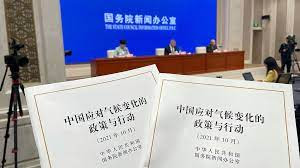China's Comprehensive roadmap for tackling climate change
China recently released a white paper entitled "White Paper on Responding to Climate Change: China's Policies and Actions," the document was released by the State Council Information Office. The White Paper outlines China's efforts to tackle climate change. With the help of this document, China's successful experience and vision can be shared with the international community. The White Paper consists of four sections in addition to the preface and summary.
These include China's new response to climate change, the implementation of China's national strategy to actively tackle climate change, significant changes in China's response to climate change, and a fair outcome based on common interests. And the building of a sound global climate governance system. The White Paper states that climate change is a common challenge for all mankind. China attaches great importance to tackling climate change.
As the world's largest developing country, China has adopted a series of effective strategies and measures in response to climate change, overcoming its economic and social difficulties. China is also actively involved in global climate governance and its efforts to tackle climate change have yielded positive results.
According to the White Paper, after succeeding in building a comprehensive, moderate and prosperous society, China has now embarked on a new journey towards building a modern country and achieving national rejuvenation. Ensuring high-quality development requires tackling climate change in the country, an important issue that is affecting the well-being of not only the Chinese people but the people of the world.
According to the White Paper, China will move towards a new stage of development, adhere to a new development philosophy and adopt a new development drive to promote high-quality development. With the reduction of carbon emissions, environmental development will be taken as an important strategic goal, and the carbon pack and carbon-neutral targets will be included in the overall economic and social development process of the country.
The country will reduce both pollution and carbon emissions, promote a comprehensive transition to green and low-carbon economic and social development, and achieve a model of innovation that bridges the gap between humanity and nature. in harmony.
According to the White Paper, the challenges posed by climate change are real, serious, and long-lasting. A concerted effort by the entire international community is needed to address this issue. China will live up to its commitments and continue to support multilateralism.
China, along with other parties, will pursue comprehensive, balanced, effective, and sustainable implementation of the United Nations Framework Convention on Climate Change and the Paris Agreement, and will contribute as much as possible for the sake of a better planet for all humanity.
China will further advance efforts to control greenhouse gas emissions, promote green and low-carbon development in urban and rural construction, and establish a green and low-carbon transportation system. Further development of carbon market construction will continue.
Prior to this White Paper, China had recently issued a strategy for reaching the Carbon Pack before 2013. The strategy included implementing a new development concept in a new development phase, creating a new development structure. Light development and low carbon emissions will be ensured with the help of short and medium or long-term goals.
It also focuses on harmonizing sustainable economic growth and economic restructuring, incorporating carbon packs, carbon neutrality into economic and social development, and improving production and the way of life. Greening to promote economic and social development on the basis of high resource efficiency and green and low carbon emissions, and ensuring that the targets of the Carbon Pack are met before 2013.
The strategy sets out key targets, including non-renewable energy utilization ratio, energy efficiency, and reduction of carbon emissions. Emphasis has been placed and arrangements have been made to strengthen international cooperation and policy in this regard.
China seeks to achieve significant results in the comprehensive green transformation of economic and social development in the country by 2030 and to ensure that energy efficiency in key energy industries reaches international advanced levels.
By 2060, a comprehensive system of clean, low-carbon, safe, and efficient energy, including an economic system for green, low-carbon revolving development, will be established, and the proportion of non-renewable energy consumption in the country will exceed 80%.





Comments
Post a Comment